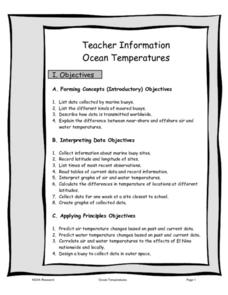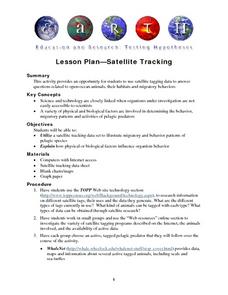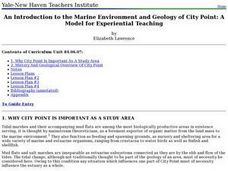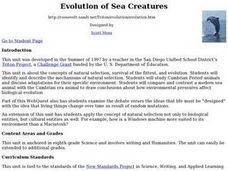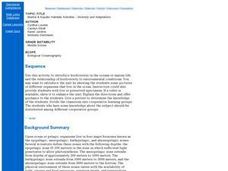ReadWriteThink
Webcams in the Classroom: Animal Inquiry and Observation
Boost observational skills with an inquiry-based lesson that takes scholars on a virtual field trip. With help from webcams, learners observe animals in a zoo or aquarium. Observations go into a journal and a discussion is held to review...
NOAA
Journey to the Unknown
Go where no one has gone before. Learners experience what it is like to be a scientist exploring new territory. Using audio and a scripted text, pupils take a trip in the depths of the ocean. They follow their trip with a hands-on...
National Wildlife Federation
Plastic in the Sea
How much plastic do people use? Class members identify how plastic is involved in their daily lives by looking at food packaging either at a grocery store or at home. Learners view statistics for the amount of plastics found on a beach...
Aquarium of the Pacific
Kelp Forest Conservation
There otter be a better way. As a class, groups work together to create a food web based on the organisms in the kelp forest. Budding scientists watch a video on the kelp forest to see how the organisms create a food web and hear about...
Curated OER
The Benthic Drugstore
Students identify at least three pharmacologically- active chemicals derived from marine invertebrates. They describe the disease-fighting action of at least three pharmacologically-active chemicals derived from marine invertebrates.
Curated OER
Biodiversity
Learners explore the biodiversity of the national marine sanctuaries. In this science lesson, students view a video about Cordell Bank National Marine Sanctuary and Hawaiian Islands Humpback Whale National Marine Sanctuary. Learners work...
Curated OER
High School Marine Science at its Best: Research Collaboration
Students formulate a more accurate understanding of the true nature of scientific research and the challenges and rewards of field investigations.
Curated OER
You Are What You Eat: Plastics and Marine Life
Students study the different types of plastics and see which ones sink or remain buoyant. In this ocean environmental lesson students complete several handouts, and view a film on PBS.
Curated OER
Birds
Learners list marine birds in their area and report on the threats made to these species. In this marine life lesson students compare bird count data and argue either for or against its accuracy.
Curated OER
Ocean Temperatures
Students list data collected by marine buoys and the different kinds of moored buoys. They describe how data is transmitted worldwide. They explain the difference between near shore and offshore air and water temperatures.
Curated OER
Secrets of the Ocean Realm - Survival in the Sea
Students determine the sequential links in a marine food chain and identify the roles that various organisms play in this chain. Students develop charts as visual aids for illustrating marine food chains.
Curated OER
Satellite Tracking
Students apply satellite tagging data to investigate questions related to open-ocean animals, their habitats, and their migratory behaviors. They determine how physical or biological factors determine organism behavior using a data...
Curated OER
What Lives In A Shell?
Second graders study the readily observable characteristics of marine invertebrates, 2nd graders research the invertebrates and complete worksheets in this series of lessons.
Curated OER
An Introduction to the Marine Environment and Geology of City Point: A Model for Experiential Teaching
Students begin the lesson by researching the history of City Point, Connecticut. Using a map, they color areas they were asked to find and discuss why the areas are important to the community. As a class, they are shown recent slides...
Curated OER
Orca United Nations
Learners study the differences between sets of data and explain how organisms are adapted to their environment. In this marine mammals lesson plan students analyze data based on set criteria.
Curated OER
Evolution of Sea Creatures
Students identify and describe the mechanisms of natural selection. They study Cambrian Period animals and discuss adaptations for their specific environment.Students compare and contrast a modern sea animal with the Cambrian era animal...
Curated OER
Marine & Aquatic Habitats Activities - Habitats of Birds, Fish, and Mammals on the Island and the Pacific Region
Students create habitats in jars to understand integral aspects of plants' and animals' habitats.
Curated OER
Ocean Exploration: Dentists of the Sea!
Learners watch videos about unusual fish behavior and write to marine scientists about the proper care of fish. In this fish lesson plan, students watch the videos on how to properly transfer fish to saltwater, and they do so in an...
Curated OER
Aquaculture Productions Systems Quiz
In this aquaculture system learning exercise, high schoolers complete 14 true or false and fill in the blanks questions. They rank 4 systems in order of intensity.
Curated OER
Marine Life: Whales
Sixth graders delve into a study of whales. In this biology lesson plan, 6th graders fill in crossword puzzle utilizing vocabulary generated from the comparing and contrasting of common- and less common-place objects.
Curated OER
Marine & Aquatic Habitats Activities - Diversity and Adaptations
Students analyze biozones and how to identify and diagram them. They also research which organisms can adapt to different biozones.
Curated OER
Marine & Aquatic Habitats Activities - Walk in the Wetlands
Students research various types of fresh water wetlands and identify the common animal and plant life in these different ecosystems. They further analyze the need to protect these wetlands and explore their varied uses.
Curated OER
Ocean Life Zones Notes
In this ocean zones worksheet, students label the ocean diagram with the different zones. Then students write in animals that live in each of the zones and research basic information about those animals. This worksheet has 6 fill in the...
Curated OER
Beach Scene
In this beach scene worksheet, students cut out the 12 beach-related items and paste them to the 2 sheets of beach scenery. This worksheet may be used for various classroom projects.











